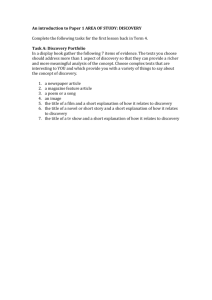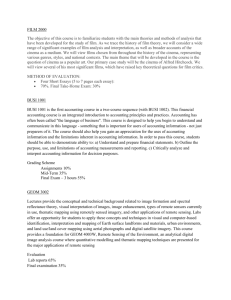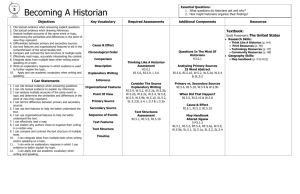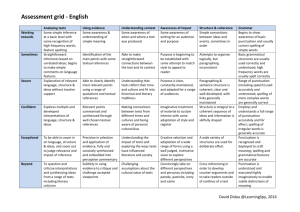HD462 - University of Brighton
advertisement
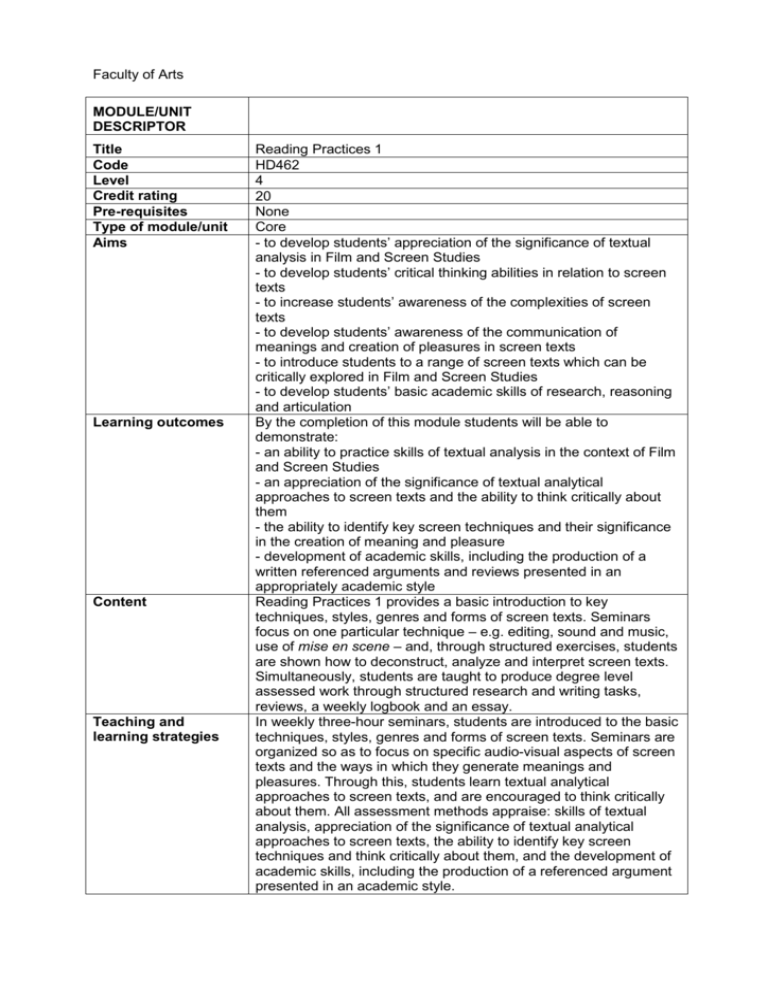
Faculty of Arts MODULE/UNIT DESCRIPTOR Title Code Level Credit rating Pre-requisites Type of module/unit Aims Learning outcomes Content Teaching and learning strategies Reading Practices 1 HD462 4 20 None Core - to develop students’ appreciation of the significance of textual analysis in Film and Screen Studies - to develop students’ critical thinking abilities in relation to screen texts - to increase students’ awareness of the complexities of screen texts - to develop students’ awareness of the communication of meanings and creation of pleasures in screen texts - to introduce students to a range of screen texts which can be critically explored in Film and Screen Studies - to develop students’ basic academic skills of research, reasoning and articulation By the completion of this module students will be able to demonstrate: - an ability to practice skills of textual analysis in the context of Film and Screen Studies - an appreciation of the significance of textual analytical approaches to screen texts and the ability to think critically about them - the ability to identify key screen techniques and their significance in the creation of meaning and pleasure - development of academic skills, including the production of a written referenced arguments and reviews presented in an appropriately academic style Reading Practices 1 provides a basic introduction to key techniques, styles, genres and forms of screen texts. Seminars focus on one particular technique – e.g. editing, sound and music, use of mise en scene – and, through structured exercises, students are shown how to deconstruct, analyze and interpret screen texts. Simultaneously, students are taught to produce degree level assessed work through structured research and writing tasks, reviews, a weekly logbook and an essay. In weekly three-hour seminars, students are introduced to the basic techniques, styles, genres and forms of screen texts. Seminars are organized so as to focus on specific audio-visual aspects of screen texts and the ways in which they generate meanings and pleasures. Through this, students learn textual analytical approaches to screen texts, and are encouraged to think critically about them. All assessment methods appraise: skills of textual analysis, appreciation of the significance of textual analytical approaches to screen texts, the ability to identify key screen techniques and think critically about them, and the development of academic skills, including the production of a referenced argument presented in an academic style. Key Information Set data: Allocation of study hours to activities Where 20 credits = 200 learning hours Activity SCHEDULED Study hours 36 Lectures, seminars, tutorials, project supervision, demonstrations, practical classes and workshops, supervised time in workshop/ studio, fieldwork, external visits, work-based learning GUIDED INDEPENDENT STUDY 164 Independent study including wider reading/ practice, follow-up work, completion of assessment tasks, revision etc PLACEMENT 0 Learning away from the University that is not a year abroad or workbased learning Learning support Seminars; tutorials; electronic learning environment; bibliography; Box of Broadcasts screening playlists Indicative reading: Pramaggiore, M and Wallis, T. Film: a Critical Introduction. London: Lawrence King, 2011 Bordwell, D and Thompson, K. Film Art: an Introduction-9th Edition. London: McGraw Hill, 2010 Hayward, S. Cinema Studies: the Key Concepts 2nd Edition. London: Routledge, 2000 Monaco, J. How to Read a Film. Oxford: OUP, 2009 Nelmes, J. Introduction to Film Studies. London: Routledge 2007 Assessment tasks 1,000 word Film Report (20%) The report will be assessed on the extent to which the students have demonstrated: - basic skills of textual analysis - appreciation of the significance of textual analytical approaches to screen texts and the ability to think critically about them - ability to identify key screen techniques and their significance in the production of meaning and pleasure - basic academic skills, including the production of a referenced review presented in an academic style 2,000 word Essay (30%) The essay will be assessed on the extent to which the students have demonstrated: - basic skills of textual analysis - appreciation of the significance of textual analytical approaches to screen texts and the ability to think critically about them - ability to identify key screen techniques and their significance in the production of meaning and pleasure - basic academic skills, including the production of a referenced review presented in an academic style Logbook (50%) The logbook will be assessed on the extent to which the students have demonstrated: - basic skills of textual analysis - appreciation of the significance of textual analytical approaches to screen texts and the ability to think critically about them - ability to identify key screen techniques and their significance in the production of meaning and pleasure - basic academic skills, including the production of a referenced review presented in an academic style Key Information Set data: Type of assessment tasks Activity WRITTEN Summative assessment tasks which lead to the award of credit or which are required for progression (expressed as a whole number) Written assignment/ essay, report, dissertation, portfolio, project output % 0 Written exam COURSEWORK PRACTICAL 100 0 Oral assessment and presentation, practical skills assessment OTHER 0 Set exercises assessing application of knowledge, analytical, problemsolving or evaluative skills Brief description of module/unit content and/or aims (maximum 80 words) Area examination board to which module/unit relates Module or unit team/ authors/coordinator Semester offered, where appropriate Site where delivered Date of first approval Date of last revision Date of approval of this version Version number Replacement for previous module/unit Field for which module/unit is acceptable and status in that field Course(s) for which module/unit is acceptable and status in that course School home External examiner Reading Practices 1 examines the ways in which screen images are produced, as well as their meanings, pleasures and significance. The unit introduces students to the study of screen texts at degree level through an examination of basic screen styles and techniques, as well as critical methodological approaches to screen images and practices and cultures. Students are taught to produce degree level assessed work through incremental written assignments (reviews and logbook entries) building up to a more extensive analytical essay. Examination Board for Film & Screen Studies Film & Screen Studies 1 Falmer September 2011 April 2012 3 Film & Screen Studies - Compulsory Film & Screen Studies - Compulsory Humanities Dr Corin Depper


